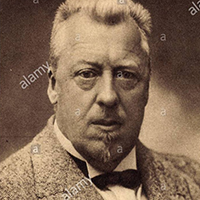Hugo Eckener
Hugo Eckener was the manager of the Luftschiffbau Zeppelin during the inter-war years, and also the commander of the famous Graf Zeppelin for most of its record-setting flights, including the first airship flight around the world, making him the most successful airship commander in history.
Hugo Eckner wa a German aeronautical engineer and commander of the first lighter-than-air aircraft to fly around the world. Hugo Eckener was the manager of the Luftschiffbau Zeppelin during the inter-war years, and also the commander of the famous Graf Zeppelin for most of its record-setting flights, including the first airship flight around the world, making him the most successful airship commander in history. He was also responsible for the construction of the most successful type of airships of all time. An anti-Nazi who was invited to campaign as a moderate in the German presidential elections, Eckener was born in Flensburg as the first child of Johann Christoph Eckener from Bremen and Anna Lange. As a youth he was judged an “indifferent student”, and he spent summers sailing and winters ice skating.
Nevertheless, by 1892 under Professor Wilhelm Wundt, Eckener had earned a doctorate “magna cum laude”in what today might be deemed experimental psychology. at the University of Leipzig.
Eckener then began his military service in the Infantry Regiment 86 in Flensburg
As a member of the firm operated by Ferdinand, Count von Zeppelin, Eckener helped to develop the rigid airships of the early 1900s. During World War I, Eckener trained airship pilots and directed the construction of 88 Zeppelins for the German navy.
Returning to commercial construction in November 1918, after Zeppelin’s death, Eckener succeeded in popularizing airship travel. He commanded the airship ZR-3 in its flight across the Atlantic Ocean in 1924. The ZR-3 (later named Los Angeles) had been built for the United States as a war reparations payment. Eckener also commanded the Graf Zeppelin on its epic around-the-world flight in 1929 and on its polar-exploration flight in 1931.
Eckener was popular internationally but not within Adolf Hitler’s government, which had relieved him of airship command prior to May 6, 1937, when the Hindenburg, successor to the Graf Zeppelin, burned at Lakehurst, N.J., with 36 casualties—a tragedy that ended international passenger airship flights. In 1938 Eckener was sent to the United States in an unsuccessful attempt to buy helium for German dirigibles, which had been using the dangerous hydrogen. He spent his last years as head of a machine factory.

Hugo Eckener
Date of Birth: 10 Aug 1868
Birth Place: Flensburg, Germany
Proffession: manager of the Luftschiffbau Zeppelin
Nationality: German
Death: 14 August 1954, Friedrichshafen, Germany


